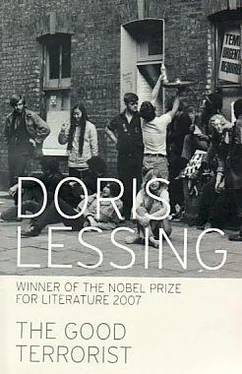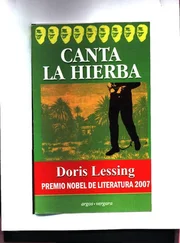That breathing of theirs going on up there in the dark, she could not stop listening, for it seemed that something was being said that she ought to be understanding - but she could not quite reach it, grasp it. The two different breathings, in and out, in and out, went on and went on, had to go on - yet could stop unpredictably for what seemed like minutes; though of course Alice knew that was nonsense, it was only because she was straining her ears with such fury of concentration that time slowed down. While one of them, Dorothy or Cedric, was in lull of breath, the other went on breathing, in and out, keeping life going, and the silent one took a breath and came back into the dialogue that seemed to be going on between them. A conversation, that was what it seemed like to the child listening there, as if her parents talked to each other still, not in words now, but in a language Alice did not know. In and out, in and out, with many little halts and hesitations and changes of pitch, they might have been questioning each other - and then (and Alice waited for it) the stage where the breathing became regular, deep and far off, further away every minute.
Those two people there, the two great powerful people in that large bed which was the other focus of the house (the great table in the kitchen being the first) - why, it was like sleeping in the same room as two creatures that were hardly human, so alien and secretly dangerous did they seem to Alice as a child, and then growing older, at eleven or twelve, and then older still, at fifteen or so. She changed, grew up, or at least grew older, but it seemed that they did not. Nothing changed. It was always the same, that scene after the party, with the two of them, her parents, sliding into that bed of theirs, arms around each other, and then willingly sliding into the sleep which took them so far from Alice that she was always lifting herself up on her elbow to strain her eyes through the dark of the room towards the two mounds, long, heavy, that were her parents. But were not now her parents, had become impersonal, had gone away from her. Could not be reached. Not unless she crept out of her sleeping bag and went to touch one of them awake. At which Cedric, or Dorothy, would indeed come awake, return to being himself, herself; as if impostors, dark and frightening and mysterious, had inhabited those sleeping bodies but had been chased away by Alice's touch. But then Dorothy, or Cedric, would say, sleepy and startled, "What is the matter, Alice? Go to sleep." And they would have already turned away from her, have gone swiftly off into that other country - and the impostors were back, not Dorothy, not Cedric. And then Alice would lie awake, listening to the breathings, the snufflings, thick inarticulate mutterings coming out of that sleep that was going on above her, on the plateau of the bed; and listening to her own blood pumping and swishing through her body, and thinking how gallons of blood were swirling around up there in those two bodies.... She could not sleep; or slept, coming awake with anxiety, and, the moment there was any light behind the silent, listening curtains, which hung there all night, witnesses with her of the absence of Dorothy and Cedric from their bed, their room, their home, their children, she crept out of the room. The house, of course, was in chaos. Everywhere in it people still slept, so that she could hardly dare open a door for fear of what she would see. But in the kitchen it was safe, and there she worked away. She would have liked some help - her brother, Humphrey, for instance. But he was only too happy to accept his parents' invitation to find some other roof to sleep under, and he was seldom there.
After the age of about twelve, Humphrey was less and less at home, staying not just down the street for a night, but with friends all over the country, sometimes for weeks at a time. To Alice it seemed that it was the parties that began this process. Feeling the way she had done (not that they had ever talked about it, but she just knew), like some small sea creature clinging for dear life to a rock but then being battered and bashed by great waves and washed off, he had drifted away. As she had done, later. But separately; they scarcely saw each other. Asked whether she had brothers and sisters, Alice had to remind herself she had a brother.
Alice had not thought of this for years; it was her arms stretched round the great silvery saucepan that brought it all back. And she could have gone on standing there, but someone touched her on the shoulder: a man, a workman, for he was in white overalls and carried a bag of tools - yes, the shop she stood outside was being done over - and he said, "Are you all right, love?"
"Yes," said Alice, "yes." As if to say, "Why ever should you think I wasn't?"
"We were beginning to wonder about you," said he. "You'd taken root, from the look of it!" He laughed, hoping she would; his kindly face - almost certainly a father's, not to mention a husband's - was concerned for her. And she laughed, and went on to number 43, where she carried in her saucepan to applause because of its magnificence and scope and potential, and she smiled as she stood in the kitchen working at her soup while comrades came in and out to sample it, or to make sandwiches, or sit down to eat take-away. She was, quite simply, dissolved in grief because of the loss of her real, her own home, and because of what she had been remembering as she stood there on the pavement. Good Christ, she was thinking as she stood in the kitchen smiling away (everyone's Alice, dependable, helpful, a treat), how could they have done that to me? They took my room away from me, just like that, as if it wasn't my room at all, as if they had only lent it to me - "Alice, you'll just have to give up your room again." It went on for years. What the fucking hell did they think they were doing? Why, every time she had felt that it was not really her home at all, she had no right to a place in it, and at any moment her parents would simply throw her out altogether....
But this is all silly, Alice was thinking, chopping, slicing, mixing, smiling. Most of the people in the world don't have half what I had, and as for their own rooms...
Never mind, the Congress would be such hard work, she would have to stop thinking about it all, thank goodness.
On the Friday night, when everyone had arrived, and there were twenty-four people crowding in, the amazing soup pot fed them all, and was stocked again, at one in the morning, when everyone went to bed, to be ready for next day.
By half past nine next morning, all the London comrades had arrived. They went over the house, exclaiming, as well they might, at its size, its comfort, its amenities. More than one, from less well endowed squats, took baths at once. The stacks of bread in the kitchen were immediately depleted, and Alice quickly ran out for some more. This weekend was going to cost... she did not want to think about it.
Everyone praised, too, the decoration of the sitting room.
Over the mantelpiece was an enormous red flag, with the emblem of the CCU in one corner, embroidered last night by two of the girls from Birmingham. In one corner of the soft living red was a hammer and sickle in gold, and in another a rooster and a rose, in green.
A picture of Lenin was on the wall opposite the flag. Next to Lenin, and several times the size, was a poster of a whale: "Save the Whales!" On other walls were posters saying "Save Britain from Pollution!,"
"Save Our Countryside!,"
"Remember the Women of Greenham Common!," and an IRA poster with a picture of a British soldier hitting a young boy whose arms were tied. On a table in the hall were pamphlets: The Case for the IRA, all the Greenpeace pamphlets, several books about Lenin, a long poem in free verse about Greenham Common, a large variety of pamphlets from the Women's Movement, and on antivivisection, vegetarianism, the use of chemicals in foodstuffs, Cruise, Trident, the dumping of radioactive waste in the sea, the ill-treatment of calves and chickens, and the conditions inside Britain's prisons.
Читать дальше











